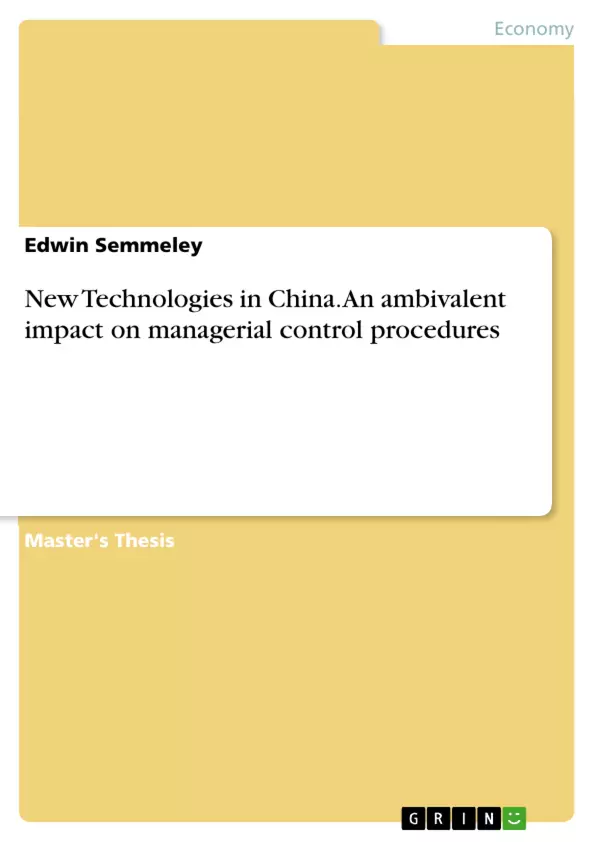In the current context of technological revolution, research on technology
acceptance is critical. The insights about how organizations successfully implement and
manage the adoption and use of information technology are of a highly practical value.
With globalization and considering the increasing weight of China in world economy, it
is necessary to study IT adoption in non-western cultures and avoid any ethnocentrism
bias. The main aim of this study is to enrich the understanding of IT acceptance in China
and of its impacts both on individual and on organizations. Indeed, most of existing
studies are focusing on the western world. The various impacts of new technologies are
established based on the existing literature on technology acceptance and on culture of IT
management and are divided in 4 categories (intensification of work, stress, blurring of
work/life balance, blurring of source of authority). To understand the last impact, the
blurring of authority, the study is basing itself on the work of the French historian of
ideas and social theorist Michel Foucault and his concept of Bio-power. The study is
based on a quantitative approach with the implementation of a survey on 300 Chinese
workers. Cronbach’s alpha and correlation coefficients were used to validate the model
and the hypotheses, notably to validate the aggregated variable on technology awareness.
Last, this study will draw comparisons between the findings and existing studies, and
discuss practical implications of the results from the stand point of a manager. This study
is linked to Change Management and could be directly used to facilitate the
implementation of a project whose aim is to increase the utilization of new technological
devices in a company.
Inhaltsverzeichnis (Table of Contents)
- Abstract
- Introduction
- Literature Review
- Technology acceptance
- Culture and IT management
- The impact of technology
- Methodology
- Results
- Technology acceptance
- Impact of technology on work intensification, stress, and work-life balance
- Impact of technology on the blurring of authority
- Discussion
- Conclusion
Zielsetzung und Themenschwerpunkte (Objectives and Key Themes)
This thesis investigates the impact of new technologies on managerial control procedures in China. The study aims to understand the acceptance of information technology (IT) in a non-western cultural context, focusing on the individual and organizational impacts. The research explores the various effects of new technologies on work intensification, stress, work-life balance, and the blurring of authority.- Technology Acceptance in China
- Impact of New Technologies on Work Processes
- Cultural Influences on IT Management
- The Concept of Bio-power and Authority Blurring
- Practical Implications for Change Management
Zusammenfassung der Kapitel (Chapter Summaries)
The introductory chapter establishes the research context and outlines the main research question. The literature review delves into existing research on technology acceptance, culture and IT management, and the various impacts of technology on work processes, including work intensification, stress, and work-life balance. The study then focuses on the impact of technology on the blurring of authority, drawing upon the work of Michel Foucault and his concept of Bio-power. The methodology chapter outlines the quantitative approach adopted, detailing the survey conducted on 300 Chinese workers. The results section presents the findings on technology acceptance, the impact of technology on work processes, and the blurring of authority. The discussion chapter analyzes the results in light of existing research and explores the implications for management. This section avoids discussing the conclusion or final chapter to avoid spoilers.Schlüsselwörter (Keywords)
The central themes and concepts of this thesis include technology acceptance, change management, Bio-power, control systems, culture and IT management, work-life balance, and Michel Foucault. The research focuses on understanding the impact of new technologies in a Chinese context, exploring the cultural influences on IT acceptance and management. This study is relevant to those interested in how new technologies affect work processes, individual and organizational impacts, and the evolution of authority structures in a globalized world.Frequently Asked Questions
What is the focus of this study on IT in China?
The study investigates how new technologies impact managerial control procedures and IT acceptance within the non-western cultural context of China.
How does technology affect the work-life balance of Chinese workers?
Research explores how IT leads to work intensification, increased stress, and a blurring of the boundaries between professional and private life.
What is Foucault's concept of "Bio-power" in this context?
The study uses Michel Foucault's theories to understand how technology contributes to the "blurring of authority" and new forms of social control.
What methodology was used for this research?
A quantitative approach was used, involving a survey of 300 Chinese workers, analyzed using Cronbach’s alpha and correlation coefficients.
How can this study be used in Change Management?
The findings can facilitate the implementation of IT projects by providing insights into cultural influences on technology awareness and adoption.
- Citation du texte
- Edwin Semmeley (Auteur), 2014, New Technologies in China. An ambivalent impact on managerial control procedures, Munich, GRIN Verlag, https://www.grin.com/document/274774



